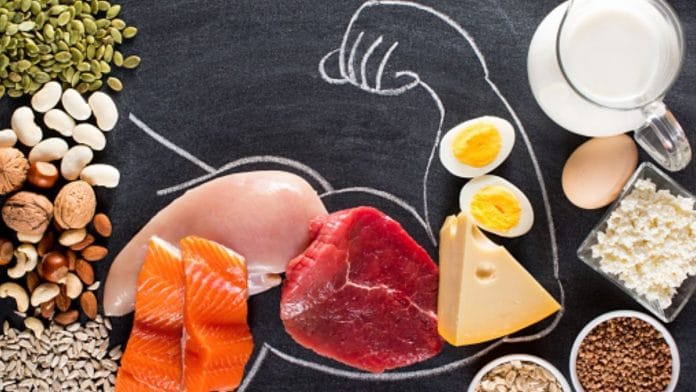A protein craze seems to have taken over the global market. From fancy whey protein shakes to expensive protein bars, people seem to be skimping on all nutrients but this.
With the onset of Covid-19, protein supplements have gained increased prominence for their apparent ability to enhance immunity. According to a two-week survey conducted by nutrition supplements manufacturer Glanbia PLC, 21 per cent of respondents from the US reported eating protein bars to boost their immunity in the first week of March—a number which rose to 23 per cent in the second week. A market analysis also found whey and casein to be the most consumed animal-based proteins of 2021.
Simultaneously, the demand for plant-based proteins is also increasing due to their popularity among consumers who are vegan, vegetarian, climate-conscious and those with milk and egg allergies. However, a high protein diet is not for all.
Also read: Your modern diet is contributing to climate change — but here’s how you can fix it
Who needs a high-protein diet?
Protein is imperative for optimum health. An average adult needs 0.8 to 1 gram of protein per kilogram of body weight per day. While the amount of protein to consume per meal is still up for debate, Harvard Medical School suggests an individual should consume at least 10 per cent of their daily calories as protein.
Moreover, the results of a 2015 study suggested 25–30 grams of protein per meal may improve appetite, body weight management, cardiovascular risk factors, or all of these outcomes. Deficiencies in protein result in muscle atrophy, delayed wound healing, and weakened immunity.
However, these outcomes are observed in people who have severe protein deficiencies and eating disorders. Often, people drink protein shakes after an intense exercise session to repair damaged muscle tissues. This is, however, not appropriate for an untrained gym-goer who does not engage in intense physical activity.
In a 2014 sports nutrition study, it was discovered that consuming protein supplements had no effect on lean muscle mass or muscle strength in untrained individuals. According to a 2020 study, protein supplementation worked well as part of intense exercise programmes but was not effective for everyone.
As a result, for most exercising individuals, a daily protein intake in the range of 1.4 to 2 gram per kg per day is sufficient. Apart from these individuals, older adults, young children, people with special needs and certain medical conditions need more protein than recommended.
Also read: Who said moderate drinking is good for your health? Try the right vegetables instead
Whole foods trump supplements
Whole foods should always be preferred over processed variants or supplements except for athletes and those with special nutritional needs. This is because consuming protein-rich foods may also provide healthy fats, essential vitamins, minerals, antioxidants, and reduce reliance on carbs.
Among supplements, whey protein is the best since it is quickly absorbed following consumption. According to the journal of applied physiology, whey protein is absorbed 70 per cent faster in the gut compared to other supplements containing casein and soy-based proteins. Therefore, these proteins are preferred by people who lift weights or engage in other types of strength training.
Weight loss is also linked to high protein consumption combined with caloric restriction, but whey protein wasn’t found to be a better performer than whole foods in defining these outcomes. Thus, protein shakes are just easy and convenient alternatives to whole foods with no added health benefits for those not into intense physical activity.
Also read: From vegicken curry to vegan mutton tikkas, mock meat players race to win Indian tastebuds
Protein consumption in India
Protein intake in India differs from that in developed nations. Our country is still striving to provide protein security to its citizens. The disparity in access to affordable and healthy foods across India’s socio-economic classes is a concern. In many parts of the country, the vulnerable population, which includes young children, pregnant women, and the elderly, remains at risk of severe acute malnutrition.
According to the Global Nutrition Report 2021, India is on the right track in addressing breastfeeding and nutritional anaemia but is far from competing with other Asian countries in managing ‘wasting’ in children—a condition directly related to lack of protein-rich diet.
While the Indian Council of Medical Research (ICMR) suggests between 0.8 to 1 gram of protein per kg of body weight daily, protein intake in India barely touches 0.6 gram per kg per day mark. Additionally, a 2012 study mentioned that 60 per cent of India’s total protein intake comes from cereals with relatively low digestibility and poor amino acid content.
However, recent data from the National Health and Family Survey (NFHS-5) indicates that meat, fish, and egg consumption has significantly increased among Indians in the 15-49 age bracket. These foods are considered complete sources of protein providing all essential amino acids. Considering this trend, it remains to be seen if India will overcome its protein deficiency in the coming years.
Excessive demand for high protein intake fuels the production and distribution of synthetic protein supplements, causing an increase in their consumption. The side-effects of high protein consumption on various organs are not well understood by the general population. Protein consumption should be individualised, goal-based, and specific to the nutritional target of different countries.
Dr Subhasree Ray is Doctoral Scholar (Ketogenic Diet), a certified diabetes educator, and a clinical and public health nutritionist. She tweets @DrSubhasree. Views are personal.
(Edited by Zoya Bhatti)






